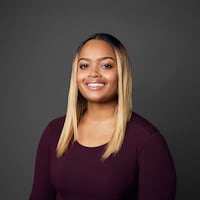Beija Velez wears many hats. She’s a former college basketball player, a model and creative consultant (who worked with Usher on his Las Vegas residency). She’s also a former host for Complex and a designer, working with Wilson Sporting Goods, the official ball for the WNBA, to design a ball for the league’s 25th anniversary in 2021.
But before any of that, she had dreams of playing in the WNBA until she learned how players in the league are severely underpaid. Last season, the average base salary for an NBA player was about $5 million compared to about $130,000 for a WNBA player, according to an NPR report.
“That is the reason why I didn’t go to the WNBA because, unfortunately, women are not compensated their worth,” Velez said.
The Decatur native and East Georgia State alumna is working for better conditions for women athletes, which is why she decided to host the new Fuse series “Like a Girl.” The six-part, unscripted show follows Velez as she interviews various women athletes to discuss topics like racism in sports, drug addiction, the experiences of trans women in sports, mental health and more.
The series premiered on Fuse in March, and the season finale aired Wednesday, May 3. “Like a Girl” features athletes like track & field star CeCé Telfer, the first openly trans woman to win an NCAA title, and April Ross, a volleyball player and three-time Olympic medalist. WNBA player and former Atlanta Dream star Angel McCoughtry is featured in the series finale.
“In sports, we’re conditioned to think we’re here to entertain, we’re here to perform, but with ‘Like a Girl,’ we’re really showing the human aspect,” said Velez, 27. “Outside of your athleticism, we’re showing that we’re dealing with issues we need to discuss. We’re not only discussing it, but we’re getting to the root of the problem and offering potential solutions that can be therapeutic and alleviate yourself from some of the stress you may deal with.”
Velez said McCoughtry’s episode deals with pay disparity for female athletes. She said seeing the athletes become so vulnerable when discussing those hard-hitting issues on the show was very powerful to witness.
“I’ve been hooping since I was a little girl, Velez said. “My first tattoo was the Nike swoosh, so to have full-circle moments like interviewing Angel McCoughtry, who’s an Olympian and played for the Atlanta Dream, really mean the world to me. My mother used to work at the CNN Center, so I used to go from there over to Philips Arena (now State Farm Arena) to watch Angel McCoughtry play with the Dream.”
McCoughtry, who resides in Smyrna, said more people need to know about the experiences of female athletes.
“I think we just don’t have enough storytelling for women athletes in general,” said McCoughtry, 36. “No one really knows about our lives, what we go through every day, what’s it’s like to be a female athlete plus a mom, plus a wife, plus a business woman/CEO, and I think people need to see more of that.”
Credit: Fuse Media
Credit: Fuse Media
McCoughtry’s episode also dives into what pregnancy means for women athletes and demanding more coverage and brand opportunities for WNBA players.
“We have a great fanbase, but it can be better,” she said. “Sometimes, people don’t even know that we’re on TV. If I’m playing on ESPN, people should know about it just like they know about the men playing.”
That’s why McCoughtry was ecstatic to see women’s basketball become a national conversation with Louisiana State University winning the NCAA championship last month.
“When I played, I got to experience the same thing LSU experienced — going to a national championship. It was a lot of hype around it, but the men’s was still bigger at that time. This time, no one was really interested in the men’s, they were interested in the women. I don’t know if I ever thought I’d see that day, but I’m glad to have seen it. I think with the backing of brands, the NIL (name, image, likeness) and social media, these girls can benefit from that and understand that women’s basketball is actually exciting.”
But she knows there’s still more work to do. She references WNBA star Brittney Griner being detained 10 months in Russia while playing there (Griner was released in December). McCoughtry said she played three years in Russia and spent more than a decade playing in other countries.
“She wouldn’t have been there if we were paid more money,” McCoughtry said. “To play year-round is very taxing on our bodies, and it’s tough. I think I suffered knee injuries because I was playing year-round just to catch up.”
Velez hopes that “Like a Girl,” will help encourage athletes to share their stories.
“I hope that the series serves as a forum of people really just coming forward and understanding it’s ok to ask for help,” she said. “That makes us human at the end of the day.”
All episodes of “Like a Girl” can be streamed by visiting fuse.tv.




